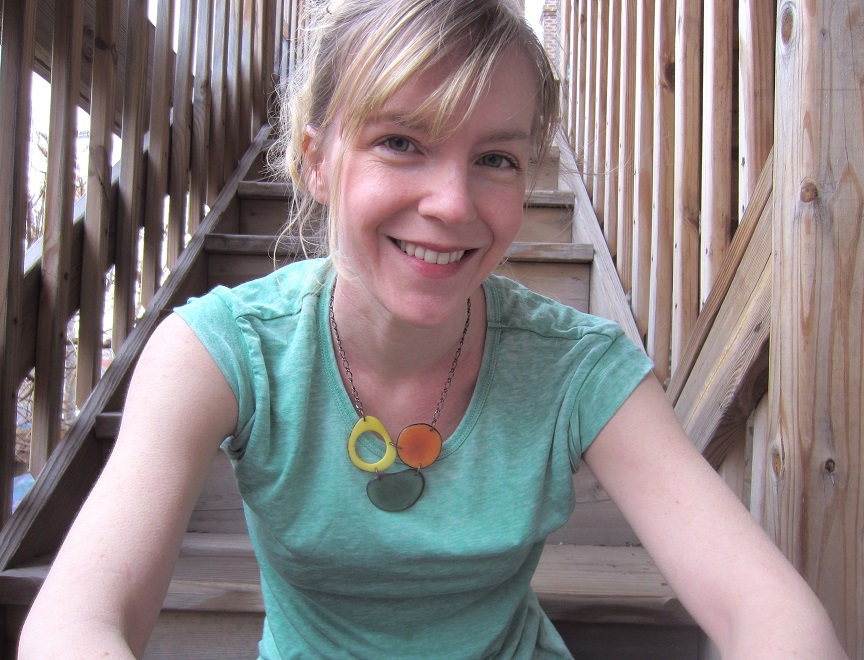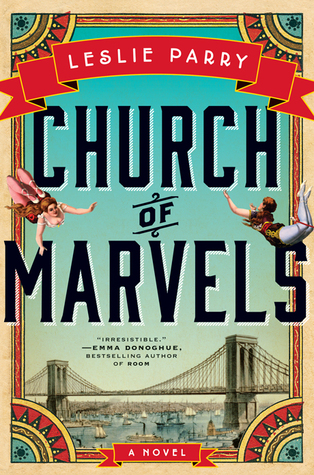Interview: Leslie Parry
 Midwestern Gothic staffer Hannah Bates talked with author Leslie Parry about Midwestern virtues, New York’s underbelly, balancing fact and fiction, and more.
Midwestern Gothic staffer Hannah Bates talked with author Leslie Parry about Midwestern virtues, New York’s underbelly, balancing fact and fiction, and more.
**
Hannah Bates: What’s your connection with the Midwest?
Leslie Parry: I’ve lived in Chicago for nearly four years. I’ve made my home here; I’m about to raise a child here. My partner is a Midwesterner, my mother is a Midwesterner, my grandparents grew up in the Austin neighborhood of Chicago. I came here in the summers growing up – went to Cubs games, swam in Lake Michigan. So it’s a place that’s figured into my imagination ever since I was young.
HB: As a graduate of the Iowa Writers’ Workshop and a resident of Chicago, has the Midwest inspired or affected your writing?
LP: Absolutely. As a writer I find myself interested in the tension between the public self and the private self. I was born and raised in southern California, and once I moved away, I was surprised at how dismissive people could be of my hometown (even if they’d never been there themselves!): Oh, L.A. – everyone’s so shallow and plastic; there’s no culture, etc. Of course this is comically untrue, and so my earliest impulse as a writer was to offer a counter-narrative to a really boring and unimaginative cliché. It’s become something I pay a lot of attention to now. What am I taking for granted? What often goes unseen? I think about the image of the Midwest – as a heartland, a kind of pastoral idyll, a region that embodies quintessential American virtues: industriousness, sincerity, loyalty, friendliness, inoffensiveness, conformity, safety, tradition. Living here, it’s been a gift to witness the extraordinary complexity that lies behind that image – the myriad cultures that thrive here, the thorny history of political crookedness and economic plunder, the individual characters of such historic cities, the dark sublime of the lakes. It’s a place of staggering diversity, where entrepreneurial culture, industrial culture and agriculture intersect. So that conflict – between how the Midwestern character is presented and historicized, and how life actually unfolds here, with all of its surprises and contradictions and unsavoriness – definitely influences the way I think about storytelling. How do those two personas interact with each other, counter each other, compete with each other, subvert each other? It’s made me think anew about the stories we tell about ourselves publicly, the identities we craft and disseminate, and then what the private self means, the intimate self, with all of its vulnerability and secrets.
HB: Your debut novel, Church of Marvels, concerns life in the underbelly of New York — the disenchanted circus, an insane asylum and brothels, life in tenement housing, all of the putrid smells. How were you able to set your novel apart from every other work of literature that deals with turn-of-the-century New York?
LP: I didn’t set out to write a New York book. In fact, after I moved away from New York, I wasn’t sure I’d ever write about it at all. But I like to work from the inside out, rather than from the outside in, so the characters came to me first. I began following them around, exploring their world, and I let the story grow out of their own impulses and desires. I love New York history, of course, and it’s easy to see why this era looms so large in our collective imagination: it’s the world of both Wharton and Riis, a place of extreme opulence and unthinkable poverty – a microcosm of melting-pot America at its best and its worst, its most lavish and its basest. Those polarities are always fascinating. There are many, many wonderful books that conjure up New York’s historical centerpieces: Tammany Hall, Coney Island’s Dreamland and Luna Park, the Triangle Shirtwaist Factory, etc. So I just tried to create a world that felt new and weird and intimate to me, and not try to follow or replicate what has been so masterfully depicted already. (For instance, the Coney Island of Church of Marvels is based more on my own childhood by the ocean than on my research notes.) Overall I tried not to think about the tradition or legacy of this genre, or the pressure of producing a rigorously faithful historical portrait. I just tried to make it feel real to me. I tried to tell a story that I didn’t know.
HB: To you, what are the most important elements in writing successful historical fiction? Where does the balance lie between fact and fiction?
LP: That’s a good question. Fundamentally I think the elements are the same for any writer. In the end you have to rely on your imagination, to live deeply in the world you’ve created, and see with the eyes of your characters. Research may help you understand the context of the characters’ lives, the machinations of their environment, the details of bygone habits and trades, and the social and political systems at work. But it doesn’t actually write the book for you. In any novel I want the world-building to feel complete, alive – which is different than being accurate. So while I love the research process, I never want the temptation to “get it right” to betray the characters or the truth of their emotional lives.
HB: Church of Marvels started a series of character sketches that were ultimately born into a novel. What does your process of character development look like? If you had to teach a workshop on how to write compelling characters, what would you do?
 LP: I think it goes back to that tension between the public and private selves. People will cultivate a different persona in front of others – in order to survive, to belong, to get what they need or desire, to wield control. But sometimes they work from dark or vulnerable places – shame, insecurity, loneliness, greed. How does a character behave, I wonder, when no one is around to observe him? What will he admit only to himself? What won’t he admit to himself? The theatrical nature of personhood is something I think about a lot, especially when I sit down to write. In Church of Marvels I felt Sylvan, Alphie, Belle and Odile were each living a double life of sorts. Even thought I wanted desperately to protect them, I really had to push them into situations where they were forced to make hard decisions. How would they react, I wondered, if those two lives were to cross? What would happen if they were somehow unmasked?
LP: I think it goes back to that tension between the public and private selves. People will cultivate a different persona in front of others – in order to survive, to belong, to get what they need or desire, to wield control. But sometimes they work from dark or vulnerable places – shame, insecurity, loneliness, greed. How does a character behave, I wonder, when no one is around to observe him? What will he admit only to himself? What won’t he admit to himself? The theatrical nature of personhood is something I think about a lot, especially when I sit down to write. In Church of Marvels I felt Sylvan, Alphie, Belle and Odile were each living a double life of sorts. Even thought I wanted desperately to protect them, I really had to push them into situations where they were forced to make hard decisions. How would they react, I wondered, if those two lives were to cross? What would happen if they were somehow unmasked?
HB: Your style of withholding information from the reader has been compared to that of Ernest Hemingway. What do you make of that comparison? Why do you use this method?
LP: I’ve never heard that comparison before! To speak to Church of Marvels in particular, the narrator is an illusionist of sorts, a show-woman, a performer who believes that even though the truth lies in plain sight, we’re often taught to see past it. We take things for granted; we don’t always look closer. So that’s an element I wanted to work into the actual storyline. The information is there in some form, it’s just not explicitly stated – at least not until it becomes critical – and teasing apart those strands is always enjoyable for me, both as reader and a writer. But overall I think the withholding, concealing, and omitting of information is something that happens every day, in every relationship. We’re master editors of our own lives, our own stories. It’s how we craft those public personas, how we get what we want, how we manipulate situations to our advantage, how we protect ourselves and each other. Discovery – the loss of a certain innocence – is an element of drama that continues to challenge and fascinate me.
HB: What would you say to a writer who aspires to write a novel? Any important missteps that you’ve learned from?
LP: There can be an impulse (or anxiety, really) to want to decide everything right away – to know exactly where the story is going, to have a clear vision of both the structure and imaginative universe, and to feel a sense of mastery over the material. If I could say anything to an aspiring novelist – especially to myself a few years ago – I’d say don’t be afraid of the process. Revel in it. Succumb to the messiness. Sometimes the most rewarding aspect of writing a novel is not the inspiration that randomly strikes, but the things you discover when you’re already pushing your way through, exploring, experimenting. Say yes right out of the gate – be willing to go anywhere. No matter what project you’re working on, you’re going to hit dead ends, throw out material, backtrack, rewrite. So don’t shy away from it – it’s all leading somewhere. Nothing is ever wasted. I really believe that.
HB: What’s next for you?
LP: I’m working on another novel and a handful of short stories. I’m happy to say the Midwest is a main attraction.
**
Leslie Parry is the author of the novel Church of Marvels (Ecco, 2015). Her short fiction has appeared in The PEN/O. Henry Prize Stories, The Missouri Review, Virginia Quarterly Review, The Cincinnati Review, and elsewhere. Recently her novella Kiddo was named the prize winner in Heavy Feather Review’s chapbook contest. She lives in Chicago.






